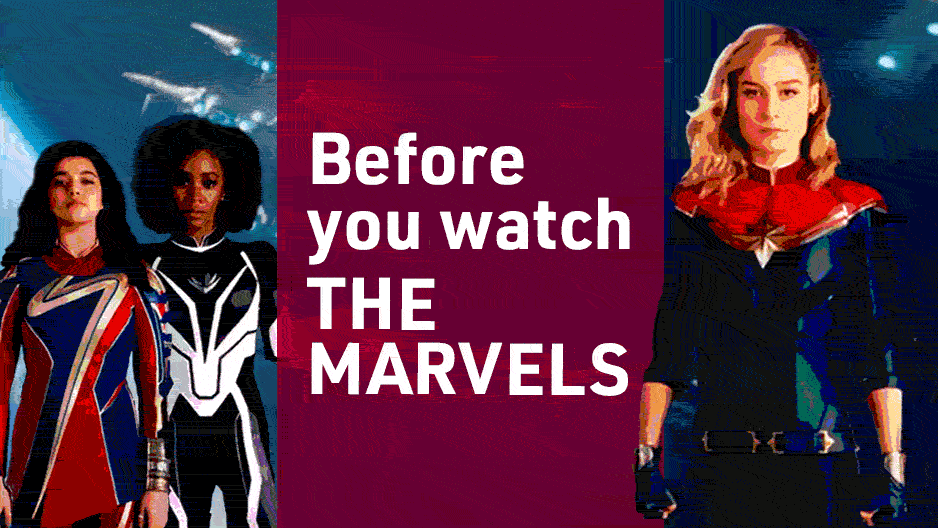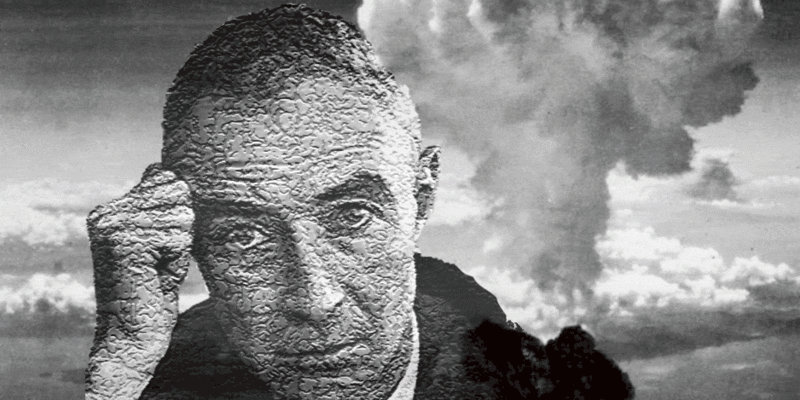What you need to know before watching ‘The Marvels’
Despite breaking barriers and promoting diversity in Hollywood, The Marvels has proven to be a box office flop.

The latest film from the Marvel Cinematic Universe, The Marvels, has generated a ton of buzz since it was released in theaters on Nov. 10, although not for the reasons anticipated by its director, Nia DaCosta. The film is a rare Marvel box office flop. The Marvels made just $46 million domestically in its first weekend, setting the record for the worst opening weekend in Marvel history.
The Marvels’ trailer was met with a sea of dislikes and criticism, so perhaps a box office bomb was to be expected. However, the film was poised to set itself apart from other superhero movies with its non-sexualized portrayal of women superheroes. Why has this approach fallen flat with audiences? Two Temple experts offer some insight into why the film has been met with criticism, and discuss how, despite the backlash, the film will still be impactful to audiences.
Jennifer Pollitt, assistant director of Temple University’s gender, sexuality and women’s studies program, explains how The Marvels and its director are challenging Hollywood and societal norms with a serious and empowering portrayal of three female superheroes. She is joined by Timothy Welbeck, director of Temple’s Center for Anti-Racism, who discusses the plot of the new film and explains why its diverse cast of female superheroes is impactful.
Key takeaways
- The trailer for The Marvels has been the subject of criticism in part because society is uncomfortable seeing serious portrayals of women in positions of power.
- Regardless of how The Marvels performs at the box office, the film will be deeply impactful to people who don’t often see themselves represented accurately and positively in popular media.
- Nia DaCosta, the first Black woman director of a Marvel film, paves the way for greater diversity among directors and will likely serve as inspiration for young women of color to pursue prominent roles in Hollywood.
- Superheroes are still popular in 2023 because they are a modern iteration of the hero’s journey, one of the most popular stories in human history and one that teaches people how to overcome obstacles and harness their own superpowers for good.
What is The Marvels about?
The Marvels is a feature film within the Phase Five installment of the MCU that serves as a sequel of sorts to the wildly successful 2019 film Captain Marvel.
According to Marvel Studios, The Marvels follows Carol Danvers (Captain Marvel), Monica Rambeau and Kamala Khan as they find their light-based powers intertwined, which requires them partner their efforts in an attempt to save the universe. More particularly, the film’s plot revolves around Captain Marvel regaining her powers and identity from the Kree, but she later learns the reclamation of her powers destabilized the universe. In her mission to counteract this outcome, she is led down an anomalous wormhole, where her powers become entangled with those of Rambeau and Khan.
Overall, the film is about three young women balancing their awe-inspiring power while navigating how to work together for the common good. This continues some of MCU’s depiction of women characters as fully actualized people rather than props to drive the motivations of a male protagonist. They are not the ones needing to be saved, but rather are the ones doing the saving. That is a notable rarity in the film industry, and hopefully will excite its audience.
—Timothy Welbeck
What is the controversy with The Marvels trailer?
The Marvels trailer quickly amassed hundreds of thousands of dislikes, which is a bummer, although I’m not entirely surprised. What about this particular trailer gets under people’s skin? In part, our society is still uncomfortable seeing women in positions of power, especially women of color. This is because femininity is often seen as frivolous or not powerful. Many folks who disliked the trailer made accusations that reflected common tropes that assume women are emotionally hysterical, fragile and incapable of making important decisions.
Additionally, we view power like pie: if women have power, that must mean that it’s being taken away from men. Women embodying their own power can feel threatening to traditional masculinity because it’s been primarily constructed in opposition to femininity. Traditional masculinity is whatever femininity isn’t. But these norms are changing and so is the understanding that everyone can have access to a piece of the power pie. Thus, stories of powerful women like The Marvels are creating questions about what it means to be a man or a woman, what it means to embody power and what happens as women’s bodies and voices take up more space in the world.
—Jennifer Pollitt
Who is the director of The Marvels?
Nia DaCosta is the first Black woman to direct a Marvel movie, and this matters because representation is so important. This sends the signal that directing a blockbuster superhero movie isn’t just reserved for white men or white women. Black women in Hollywood have historically been forced to take roles that were exclusively maids, nannies or slaves. This has been slowly shifting over the last few decades, but giving a Black woman a more prominent place of power in one of the greatest movie franchises in Hollywood history represents huge progress. Nia directing this movie paves the way for a more diverse group of superhero movie directors in the future. I’m certain that Nia’s visibility as the director of The Marvels is already helping Black girls and young women reimagine their dreams and aspire to one day do what Nia is doing now.
—Jennifer Pollitt
Why is Marvel going all female?
It’s always interesting when a film is accused of “going all female,” because we rarely see this accusation made in the other direction—that a film is “going all male.” When the cast, director and producers are all male, the assumption is that the film is normal and thus has more mass appeal and larger profits at the box office. (I think Barbie has already proven this wrong!) Women still aren’t seen as worthy characters capable of leading their own quest to save the world. The Marvels challenges this view and gives audiences of all genders an opportunity to see women as main characters in a superhero movie. This matters because it teaches us and reinforces that women are just as strong, brave, capable and resilient as men, and that women possess agency to make choices about their life’s purpose. I’m hopeful that Hollywood is starting to recognize that heroism and power aren’t solely reserved for men.
—Jennifer Pollitt
Do you think The Marvels will be a hit or a miss?
I hope The Marvels is successful. But regardless of its box office performance, I know this film will be powerful and inspirational, especially for those who don’t often see themselves reflected in this way in popular media. Growing up, I remember watching superheroes and badass women like Wonder Woman, Lara Croft and Charlie’s Angels. They all looked super sexy, and as a little girl it made me believe that if I wanted to be strong and successful that I, too, had to be sexy.
The difference between The Marvels and other superhero movies is that it was intentionally designed to not sexualize women. This is really important because it demonstrates clearly that women and girls are more than just bodies for someone else's pleasure. That they have their own hopes, dreams, brains, talents, and they are not just here to be sexy. Watching a movie like this when I was younger would have helped me feel like I had a voice and a purpose. It would help me feel like I was allowed to take up space, and that I, too, could be strong, brave and powerful. “You can’t be it, if you can’t see it.” The more we can create media that reflects the multiple dimensions of all of our lives, the better.
—Jennifer Pollitt
If the success of Captain Marvel is any indication of what to expect for The Marvels (Captain Marvel grossed over $1.5 billion), this film will do well commercially. Additionally, the first part of the year witnessed several box office successes, like Barbie, The Super Mario Bros and Spider-Man: Across the Spiderverse. Even The Little Mermaid fared well at the box office despite a significant racist backlash to the casting of Halle Bailey, a Black actress, in the role of Ariel. All of that is to say, people are returning to theaters to see movies, and that should bode well for The Marvels.
But a greater measure of success for The Marvels will be its cultural resonance. The portrayals of Monica Rambeau by Teyonah Parris and Kamala Khan by Iman Vellani will be one of the few times women and young girls of color will see a superhero who looks like them on the big screen. Thrusting these depictions to the forefront of pop culture could have lasting impacts.
—Timothy Welbeck
Why do we still love superheroes?
Superheroes are a modern iteration of one of the oldest, longest lasting and most important stories in human history: the hero’s journey. This story is so popular because it gives us a roadmap to live our most authentic and satisfying lives. The hero’s journey urges us to follow the call for adventure and to take risks, and it gives us glimpses into the skills and tools we need to help others, overcome obstacles and face our fears.
We also love superheroes because, in a lot of ways, they’re just like us. Superheroes aren’t perfect; they’re flawed and complicated. They’re also ordinary and common until they tap into their powers, just like us. If you look at any superhero, their ultimate power lies in their desire to help others. It lies in their empathy, compassion, sacrifice and courage. These are superpowers we all possess. Superheroes show us that we, too, can tap into our own “powers” to create positive change in the world.
—Jennifer Pollitt
Superheroes allow us to dive into the depths of creativity and imagine ourselves within the powerful and courageous. That is why the increased efforts to represent different types of people as superheroes is so critical. They represent what we believe to be the best in us while still exhibiting vulnerabilities that challenge them. We all should be able to see ourselves that way, and superheroes are one way to facilitate that process. We often know from the beginning that the hero will win, so to speak, but how the hero wins by overcoming seemingly insurmountable odds is the fascinating part.
—Timothy Welbeck


